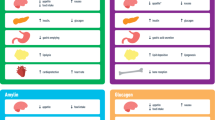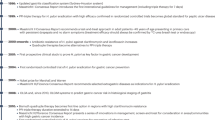Abstract
Most patients who undergo curative-intent resection for pancreatic cancer are malnourished. This correlates with poor outcomes. There are no guidelines for the nutritional management of these patients. We aimed to establish current UK practice by surveying all hepatopancreatobiliary (HPB) units. Questions covered: dietetic service, nutrition risk screening (RS), micronutrients, prehabilitation, nutritional support, pancreatic exocrine replacement therapy (PERT), and details of follow-up. Twenty-six units (83.9%) responded. Twenty-three (88.5%) provide a specialist HPB dietetic service. Twelve (52.2%) cover the entire treatment pathway. Thirteen (50.0%) routinely perform RS, eleven (42.3%) check micronutrients, and fourteen (53.8%) provide a prehabilitation programme. Twelve units (46.2%) allow nutritional supplements within 48 h of surgery, and eight (30.8%) do not allow this until at least 72 h. The use of PERT and acid-suppressing agents is highly variable. Seventeen units (65.4%) routinely provide dietitian follow-up. Practice is highly variable; robust studies are required so consensus guidelines can be formulated.
This is a preview of subscription content, access via your institution
Access options
Subscribe to this journal
Receive 12 print issues and online access
$259.00 per year
only $21.58 per issue
Buy this article
- Purchase on Springer Link
- Instant access to full article PDF
Prices may be subject to local taxes which are calculated during checkout

Similar content being viewed by others
References
Afaneh C, Gerszberg D, Slattery E, Seres DS, Chabot JA, Kluger MD. Pancreatic cancer surgery and nutrition management: a review of the current literature. Hepatobiliary Surg Nutr. 2015;4:59–71.
Ausania F, Senra P, Meléndez R, Caballeiro R, Ouviña R, Casal-Núñez E. Prehabilitation in patients undergoing pancreaticoduodenectomy: a randomized controlled trial. Rev Esp Enferm Dig. 2019;111:603–8.
Phillips M, Lordan JT, Menezes N, Karanjia ND. Feeding patients following pancreaticoduodenectomy: a UK national survey. Ann R Coll Surg Engl. 2009;91:385–8.
Martin D, Joliat GR, Halkic N, Demartines N, Schäfer M. Perioperative nutritional management of patients undergoing pancreatoduodenectomy: an international survey among surgeons. HPB (Oxf). 2020;22:75–82.
Loinaz Segurola C, Ochando Cerdán F, Vicente López E, Serrablo Requejo A, López Cillero P, Gómez Bravo M, et al. Results of a survey on peri-operative nutritional support in pancreatic and biliary surgery in Spain. Nutr Hosp. 2020;37:238–42.
Shin SH, Kang W-H, Han IW, You Y, Lee H, Kim H, et al. National survey of Korean hepatobiliary-pancreatic surgeons on attitudes about the enhanced recovery after surgery protocol. Ann hepato-biliary-Pancreat Surg. 2020;24:477–83.
La Torre M, Ziparo V, Nigri G, Cavallini M, Balducci G, Ramacciato G. Malnutrition and pancreatic surgery: prevalence and outcomes. J Surg Oncol. 2013;107:702–8.
Lassen K, Coolsen MM, Slim K, Carli F, de Aguilar-Nascimento JE, Schäfer M, et al. Guidelines for perioperative care for pancreaticoduodenectomy: Enhanced Recovery After Surgery (ERAS®) Society recommendations. World J Surg. 2013;37:240–58.
Osland E, Yunus RM, Khan S, Memon MA. Early versus traditional postoperative feeding in patients undergoing resectional gastrointestinal surgery: a meta-analysis. JPEN J Parenter Enter Nutr. 2011;35:473–87.
Zhu X, Wu Y, Qiu Y, Jiang C, Ding Y. Comparative analysis of the efficacy and complications of nasojejunal and jejunostomy on patients undergoing pancreaticoduodenectomy. JPEN J Parenter Enter Nutr. 2014;38:996–1002.
Acknowledgements
We would like to thank those who took the time to complete the survey.
Author information
Authors and Affiliations
Contributions
Conceptualisation: PM, SA. Data curation: TR. Methodology: TR, PM, AT, GS, SA. Project administration: TR. Visualisation: TR, PM, AT, GS, SA. Writing – original draft: TR. Writing–review and editing: TR, PM, AT, GS, SA. Supervision: SA.
Corresponding author
Ethics declarations
Competing interests
All authors declare no competing interests.
Additional information
Publisher’s note Springer Nature remains neutral with regard to jurisdictional claims in published maps and institutional affiliations.
Rights and permissions
About this article
Cite this article
Russell, T.B., Murphy, P., Tanase, A. et al. Results from a UK-wide survey: the nutritional assessment and management of pancreatic resection patients is highly variable. Eur J Clin Nutr 76, 1038–1040 (2022). https://doi.org/10.1038/s41430-021-01063-5
Received:
Revised:
Accepted:
Published:
Issue Date:
DOI: https://doi.org/10.1038/s41430-021-01063-5



